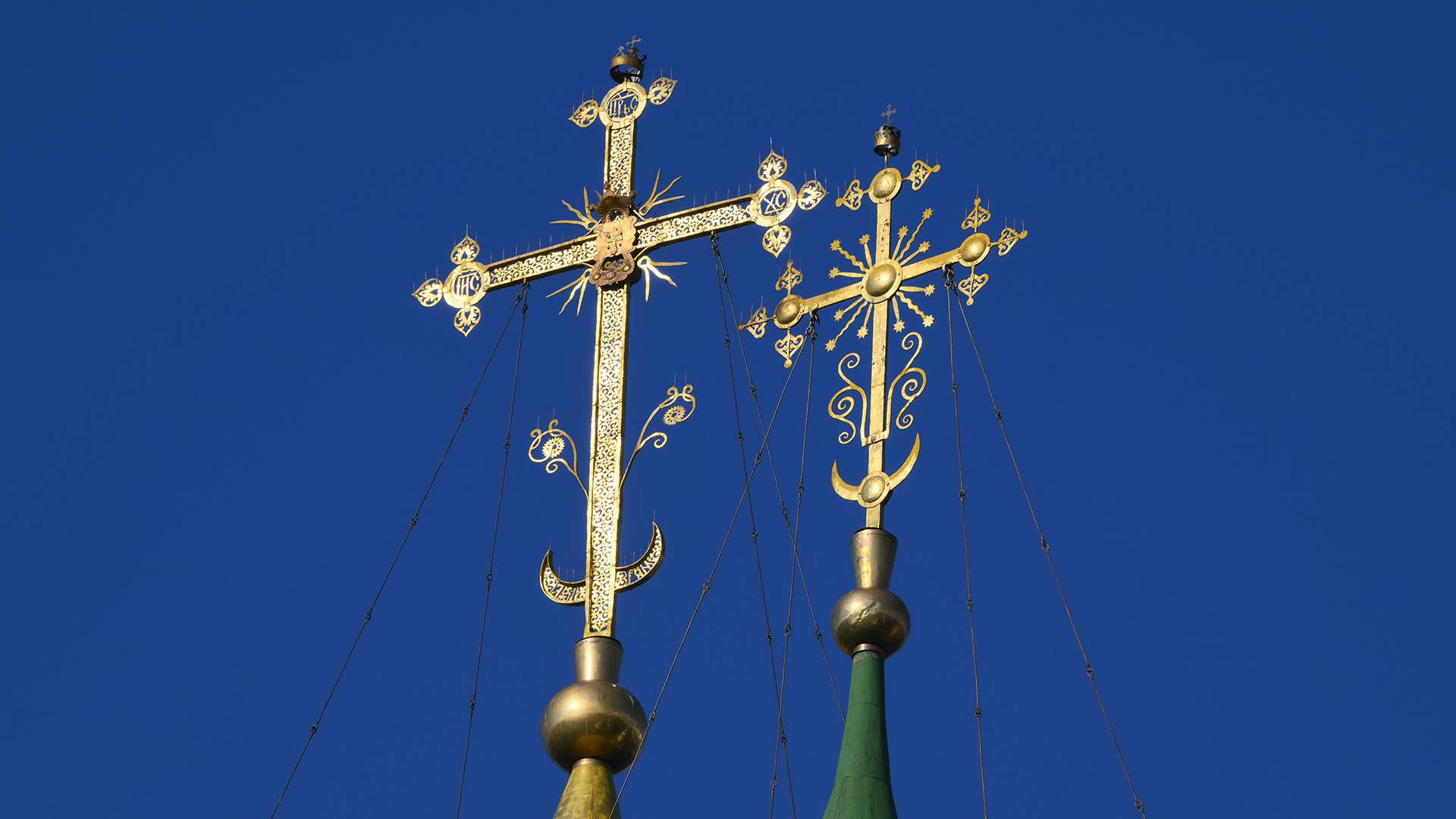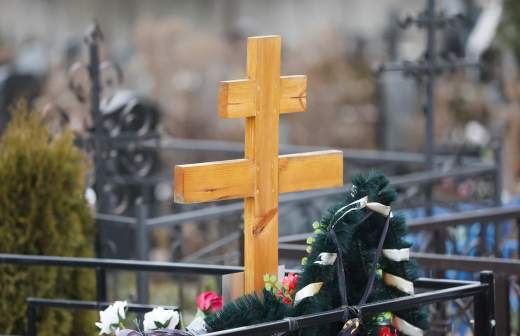Special Russian holiday Vlasiaev day: 10 strict prohibitions, omens of the day

Every year in Russia on February 24, Orthodox Christians celebrate Vlasius Day. The holiday is dedicated to the memory of the bishop and healer Vlasius of Sebastia. He is considered the patron saint of wild and domestic animals, and Catholics include him among the Fourteen Holy Helpers along with St. George the Victorious and St. Panteleimon. In 2025 the folk-Orthodox holiday falls on Monday and coincides with the first day of Shrovetide. History and traditions of Vlasyaev day - in the material "Izvestia".
Vlasyaev Day: what is the Orthodox holiday on February 24
Vlasyaev Day is celebrated annually on February 24. The event is dedicated to the memory of Vlasius of Sebastia, who was one of the early Christian saints. This day in the Orthodox calendar is especially important, because St. Vlasius was widely known in Russia as the patron saint of livestock. Often on behalf of this patron saint, livestock were called "Vlasius' kin", especially cows, which were often simply called Vlasius' cows.
In Europe the martyr is considered the patron saint of many settlements, his name is especially popular in France, Italy and Slavic countries, and in Bulgaria there is a town of St. Vlas, where a part of the relics of the saint is kept.
St. Vlasius of Sebastia, also known as Blasius, Blaise or Blasio, was bishop of Sebastia (now Turkey), healer, martyr and patron saint of animals. He lived in the late 3rd and early 4th century.
Not much is known about the early years of Vlasio's life. The future Bishop of Sebastia was born on the territory of modern Turkey in the city of Sivas. Under Emperor Diocletian, this area was the administrative center of the province of Armenia Minor, and Christians were persecuted.
According to legends, Vlasius was an educated and pious man, from his youth he stood out for his kindness, mercy and devotion to God. Already in his youth Vlasius chose the path of asceticism and secluded himself in prayer. Later he became bishop of the city of Sebastia, where he actively preached Christianity among the pagans, helped the sick and needy. When persecution against Christians intensified, he went to live on Mount Argeos (today Erciyes).
One day a local ruler named Agricola ordered the gathering of wild animals for the purpose of torturing Christians. Trappers found a cluster of animals near one of the mountain caves. The animals came there for blessing and healing. It was there that Vlasius, who was in prayer, was captured. The bishop did not resist and proudly reported that last night God had called him three times.
One of Vlasius' most famous miracles was the healing of a child. It occurred when Vlasius was already captured and was being taken to Agricola. While eating a meal, a fish bone got stuck in the boy's throat. The bishop prayed to God and delivered the child from death.
Later Vlasius helped a widow when predatory animals carried her piglet into the forest. The saint calmed the widow and told her to go home, where the piglet returned after some time. Rejoicing at the newfound animal, the woman stabbed the animal and prepared a meal, which she took to the bishop in the dungeon.
Vlasius accepted this gift and ordered to honor his memory every year: "Woman, in this way do my memory every year, then nothing of the necessary things in your house will be lacking; but if anyone else resembles you and does my memory, he will receive abundantly the gifts of God, and the blessing of the Lord will be upon him all the time of his life".
When Vlasius was brought to Agricola, he wanted to force the saint to renounce his faith, but the bishop was adamant. Then Agricola ordered the man to be drowned in the lake. However, when Vlasius was in the water, he did not drown, but began to walk on the surface of the reservoir. The man suggested that the guards call upon their gods and try to do the same, but the pagans drowned as soon as they entered the lake.
The bishop died a martyr's death by beheading, it happened on February 24, 316. According to legend, a pious woman named Elyssa buried the body of St. Vlasius right at the place of execution. Over time, miracles began to occur in this place, and today pilgrims receive healing here.
St. Vlasius had a great influence on Christianity. In Orthodoxy, he is honored as a healer and patron saint of animals. In the Catholic Church, the feast day of Vlasius of Sebastia falls on February 3. On this day the rite of "Blessing of the throat" is held, during which priests bring two crossed candles to the throat of believers, praying for protection from disease. In Europe, St. Vlasius is also considered the patron saint of pets and doctors, and in Italy he is honored as the patron saint of woolen makers.
Saint Vlasius has been canonized in both the Orthodox and Catholic churches. He is one of the Fourteen Holy Helpers, saints especially honored in the Roman Catholic Church since the plague epidemic of the fourteenth century. People turn to them for help in illnesses. Vlasius among them has a special grace of God in curing diseases of the throat, preventing suppression by food (these beliefs were first recorded in the VI century in Byzantium).
The relics of the saint were for a long time in Sebastia, but during the period of iconoclasm in 732 were transferred to the Italian city of Maratea, whose patron saint Vlasius is still considered to be. He is also venerated in the Croatian city of Dubrovnik, and is even depicted on the city's flag. According to legends, in 971 Vlasius appeared to the inhabitants of the city and warned them of an enemy attack, so that they prepared themselves.
After the Baptism of Russia, the Vlasiy temple was one of the first to appear here. Now in its place in Kiev is the Vvedenskaya Church. One of its altars is consecrated in honor of the Bishop of Sevastia.
On icons and frescoes St. Vlasius is depicted with the episcopal omophorion, with a staff or cross in his hand, as well as with animals nearby, which symbolizes his care for nature and animals.
Vlasiaev Day is a traditional and significant holiday of the Slavic peoples, especially among Russians, Belarusians and Ukrainians. In olden times in Russia this day was called not only in honor of St. Vlasius, but also "Cow Holiday", which dates back to ancient pagan traditions. It was believed that on this day it was especially important to take care of livestock, otherwise you could bring misfortune on your household. People even had a saying: "Vlasiaev Day is a cow holiday".
Customs and prohibitions on Vlasiaev Day
On this day, peasants held various rituals to protect their animals and strengthen their health. In addition, people went to markets and organized festive festivities. On Vlayaev Day it was customary to consecrate water and fodder for livestock. Holy water was brought home from the church, sprinkled in the barns, and the animals were fed with it. It was believed that it would protect animals from diseases and make them more fertile. It was also customary to weave amulets from animal hair.
On this day it was strictly forbidden to leave animals hungry, otherwise in the future they could suffer from diseases or even die. It was also considered undesirable to repair or do heavy work at home, as it could lead to ailments in livestock. Special attention was paid to stove pipes - they could not be left open, otherwise there was a risk that the dwelling would be penetrated by evil forces.
A meager dinner was also forbidden - the hosts were required to set a good table for themselves and their guests in order to live without longing until Easter.
In prayer, one turned to St. Vlasius, asking him to protect livestock, especially pregnant animals, so that they would give birth to healthy offspring. In some regions, cattle were grazed on this day after a long winter and it was believed that this would help the animals recover from the long cold weather. On the day of the memory of Vlasius of Sebastia one prays for the health and well-being of the family.
The most powerful prayer of Vlasius of Sebastia is:
"O long-suffering father, great pleaser of God, holy martyr Vlasius. Hear us, sinners, who come to you and pray to you warmly. The storm of many evils, troubles and sorrows beset us, sicknesses of soul and body and all kinds of evil impositions overwhelm us. But we do not care for our salvation, and we are not worthy to ask the Lord for help because of our sins. But thou, good shepherd, who hast great boldness with the Merciful God, as sometimes thou art led to thy sufferings, thou hast not denied the tearful widows who have come to thee, for thou hast delivered one from the affliction of the beast, and thou hast asked the Lord to heal another child; likewise now look upon thy children who come to thee at this hour, asking for comfort and help. Thou didst beseech the Lord: if any sickness or trouble should befall any man, and he should remember thy name, help anyone to glorify His Most Holy Name. Do not forsake us who pray to thee, but as thou hast promised, grant our every petition for good, through the mercy of the Almighty God, to whom be honor and glory for ever and ever. Amen."
Today the feast is not as important as it used to be, but in some Orthodox families and in rural areas old traditions are preserved. In cities, this day is celebrated more in the context of a church celebration with prayers and liturgies dedicated to St. Vlasius.
Folk and weather omens of February 24
As with any other folk holiday, Vlasiy's Day is associated with a lot of omens and superstitions, preserved from time immemorial, and sometimes coming from the pre-Christian period, when people believed in natural spirits and magic.
The Russian Orthodox Church (ROC) does not support following pagan omens and superstitions, as they contradict the essence of faith. According to the church's teachings, omens are a form of idolatry because they distract man from the true God.
However, many people believe in weather omens even today, because the weather certainly affects agricultural work and the condition of animals.
Thus, if on February 24 , Vlasius of Sebastia, the weather is clear and cold, one should expect short but strong frosts, followed by a thaw and early spring. Vlasiaevsky frosts were considered to be harbingers of warmth. If the day was cloudy and inclement, winter will last longer than usual.
If a snowstorm or snowfall began on Vlasiaev Day, it also predicted cold weather in March, but at the same time one could expect that the frosts would not be so long and sharp.
Переведено сервисом «Яндекс Переводчик»









